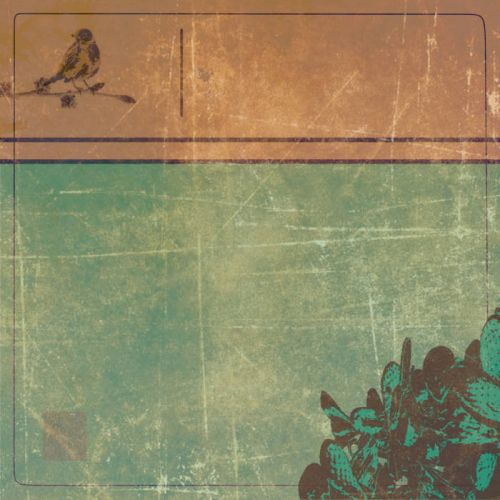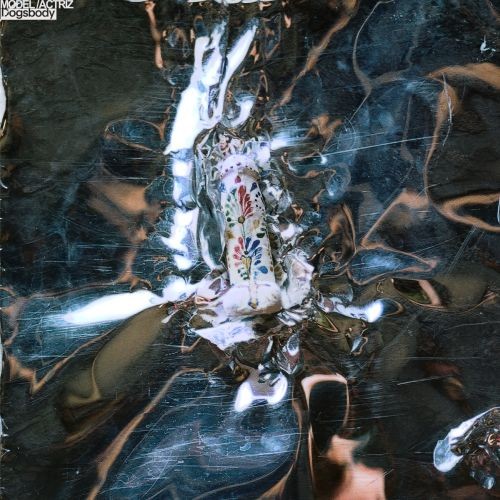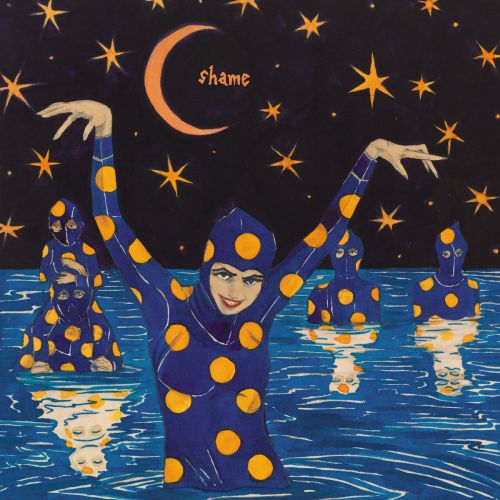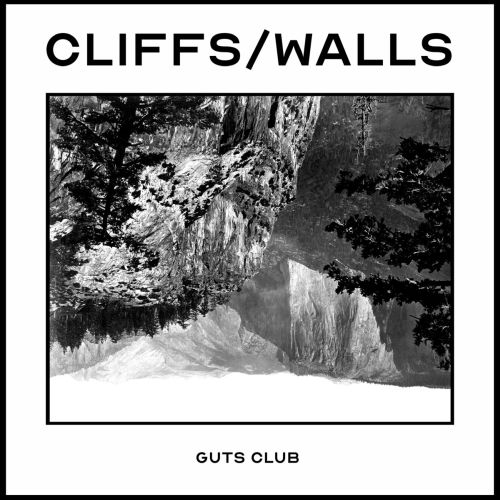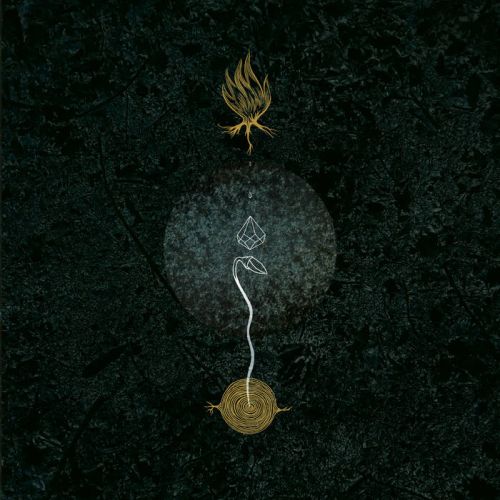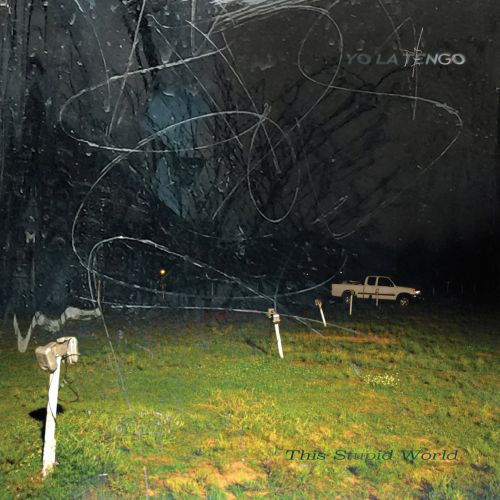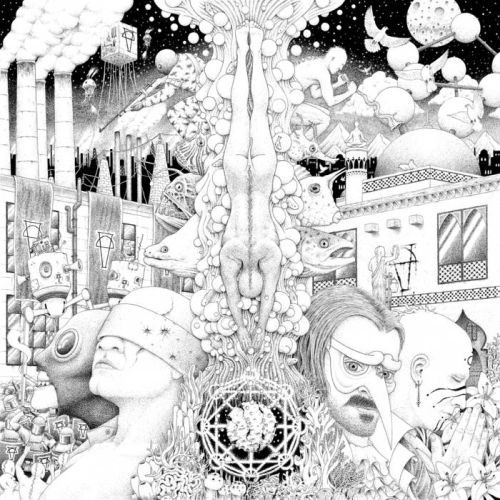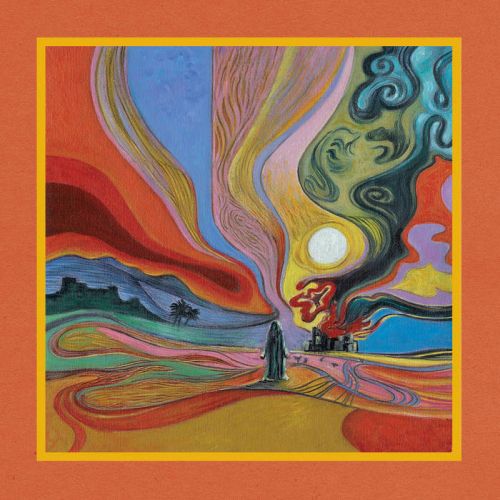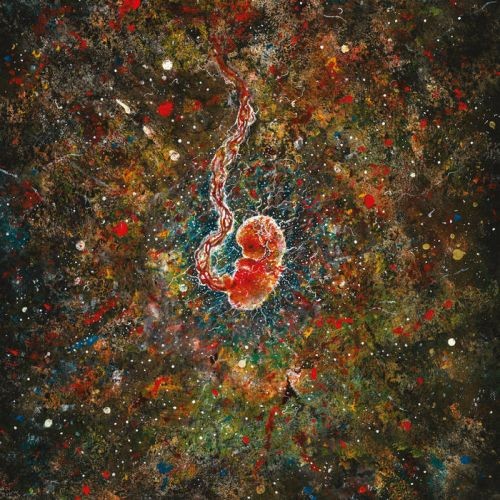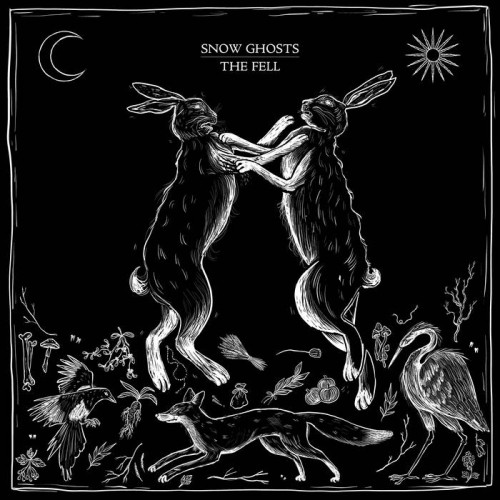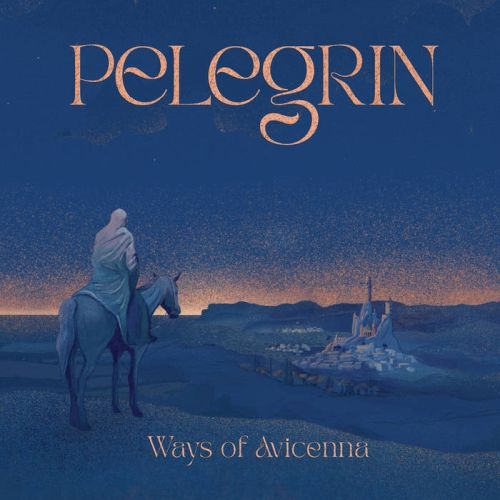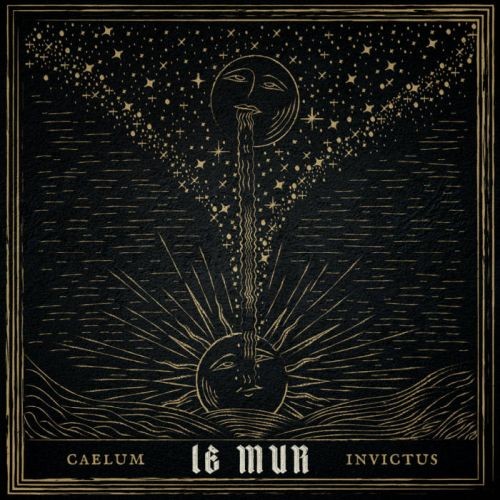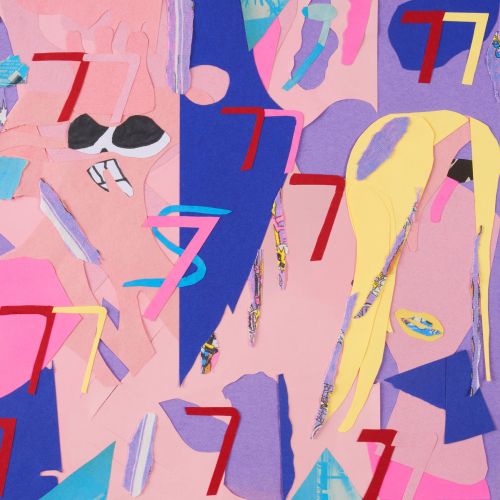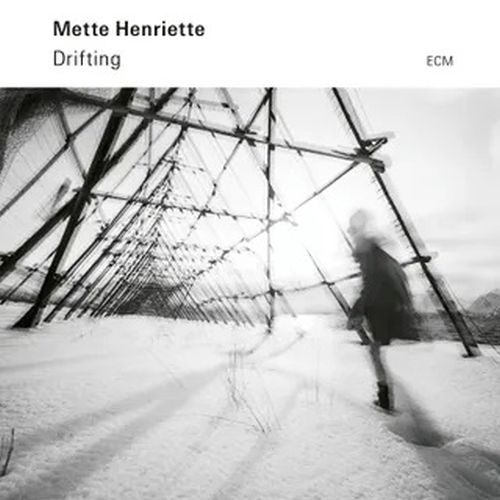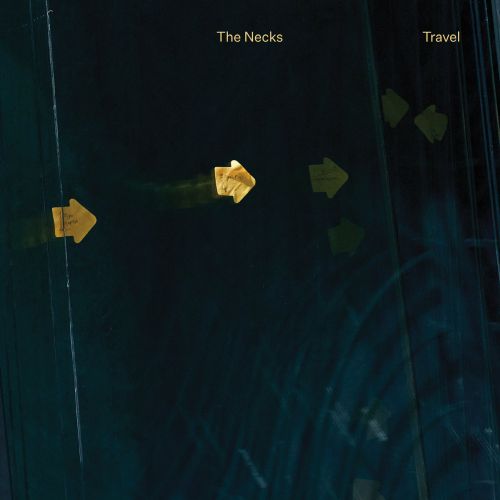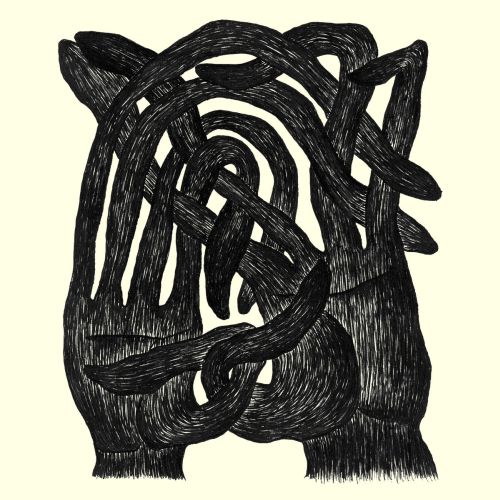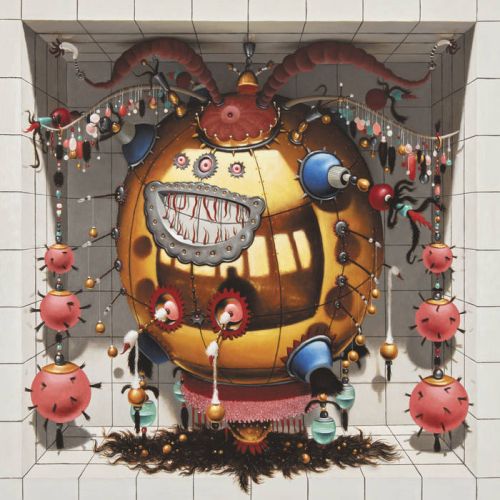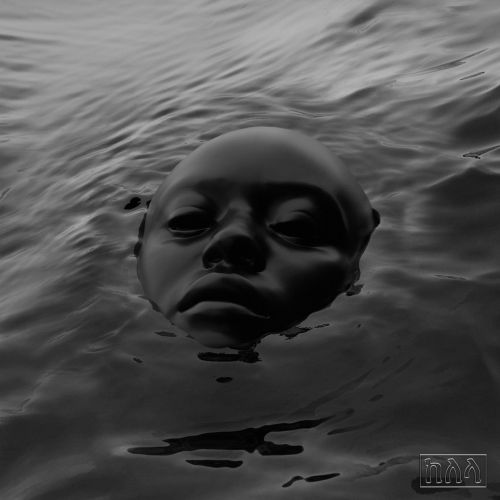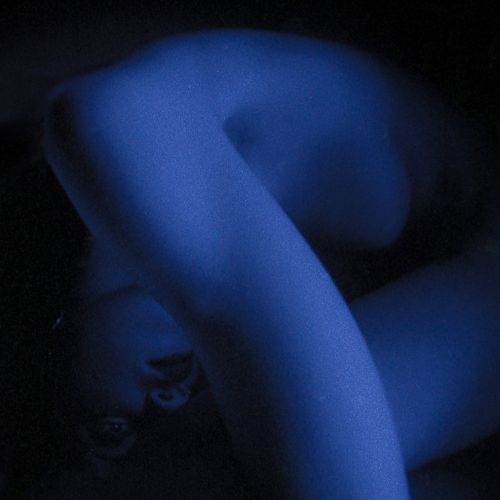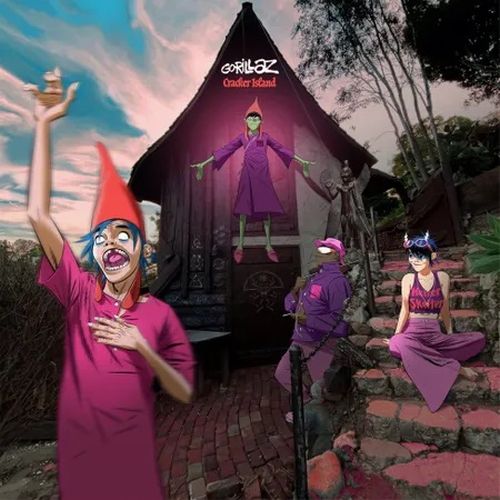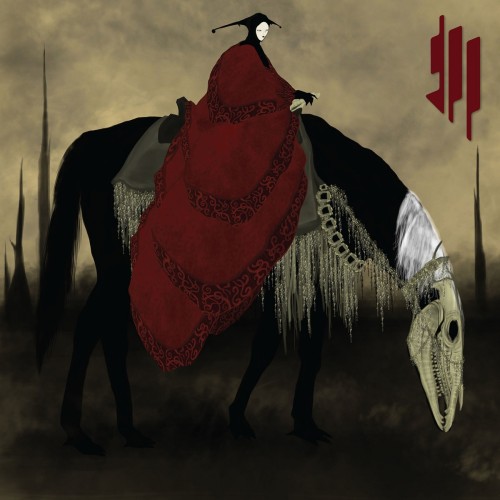Wait A Minute! This Isn't Metal! - February 2023

| Written by: | RaduP, musclassia, F3ynman |
| Published: | March 12, 2023 |
Wait A Minute! This Isn't Metal! - February 2023
Metal Storm's outlet for nonmetal album reviews
The place where we'll talk about music without growls or blast beats
unless they still have those but still aren't metal
unless they still have those but still aren't metal
We here at Metal Storm pride ourselves on our thousands of metal reviews and interviews and article; metal is our collective soul and passion, which is why we bother with this junk. That being said, we'd be lying if we stuck to our trve-kvlt guns and claimed that metal is the only thing we ever listen to. Whether we want to admit it or not, we do check out some other stuff from time to time; some of us are more poptimistic than others, but there's a whole world out there aside from Satan-worshiping black metal and dragon-slaying power metal. We do already feature some nonmetal artists on our website and have a few reviews to back them up, but we prefer to limit that aspect of the site to those artists who have been a strong influence on the metal scene or who are in some way connected to it. This article series is the place for those artists who don't matter to metal in the slightest but still warrant some conversation - after all, good music, is good music, and we all know metal isn't the only thing on this planet for any of us.
Down below, you might find some obscure Bandcamp bedroom projects or some Billboard-topping superstar; as long as it ain't metal and the album itself isn't a best-of compilation, it fits. Obviously, we're certain that not everything will be for everybody (you guys can be viciously territorial even when metal is the only thing on the menu, and we're all supposed to like the same things), but we do hope you find at least one thing that you can enjoy, instead of just pointing and screaming in horror "Not metal!" as if that would be an insult.
Here are our previous features:
January 2023
December 2022
November 2022
And now to the music...
I first encountered My Hair Is A Rat’s Nest back in September 2022 with The Longing Machine, an intriguing proposition in that it was a 24-minute song primarily rooted in screamo and post-hardcore, genres not necessarily used to such herculean lengths. The person behind MHIARN, Jake Campbell, had prior experience with writing similarly long songs, but on this new effort, Fragment, he has opted for more conventional songs. Curiously enough, despite these tracks now being clearly demarked from one another, there’s arguably more stylistic consistency here than there was on The Longing Machine.
There is a central post-hardcore/screamo core to Fragment, but musically it is very strongly oriented towards delicate, tranquil, atmospheric music in the vein of post-rock and shoegaze, containing ample dainty tremolo and clean guitar work. Songs such as “On Any Other Day” and the title track embrace the longstanding overlap of post-hardcore and post-rock, the more hectic and energetic screaming sections nicely contrasted by the passages of serene downtime. Considering I compared bits of The Longing Machine to Isis, Campbell doesn’t really veer towards the heaviness of the hardest-hitting parts of that EP; “Callous” and “Forever” have the henchest chords and the liveliest drumming, but the latter of these still leans more towards the euphoric sounds of Fragment as a whole rather than anything too challenging. MHIARN are so focused on bright, positive sounds that the frequent bursts of screams almost feel included out of obligation; for those that like their post-hardcore to be uplifting, Fragment is one for you.
Bandcamp | Apple Music | Spotify
by musclassia
Did you ever wish you could dance to early Swans? Ever felt like Death From Above 1979 just aren't crushing enough? Chat Pile could do with more pulsating synths? Wish Xiu Xiu turned into noise rock? You're in luck! Model/Actriz strike something quite in that specific with their full length debut on Dogsbody. Building up on the momentum of their 2016-2017 EPs, and putting out teaser singles for this record from as far back as 2020, this one is quite a record that works on anticipation. And tension. And loads and loads of repetition and noise. You know the drill by now.
With a vocalist that's a mix of Xiu Xiu's Jamie Stewart and Chat Pile's Randy Rulz (more of the former than the latter) to create a manic and quivering vocal performance. There's something very odd in how the vocals contrast the aggressive music, since they are passionate but they're not always matching the intensity. The music also uses repetition to create something a bit more groovy and danceable at times, other times more directly noisy and pummeling, other times letting the music breathe and the vocals do the heavy lifting. The production really works to make Dogsbody pack an even bigger punch, to make it the most terrifying dance you've danced this month.
Bandcamp | Apple Music | Spotify
by RaduP
RaduP's pick
The prospect of Paramore's punkiest album in a long time is exciting nonetheless, even if the band's reinvention from pop punk into new wave-ish pop rock after the departure of some founding members (the Farro bros) still had them make great music. More departures and a Farro rejoining later, Paramore is now, for the first time ever, having the same core lineup on two albums, despite the albums being the furthest apart. Sure, members like Hayley Williams have embarked on solo careers too, but normally this would be the perfect time to just cement the sound they had on After Laughter. Well, nope!
If a return to the punk sound was in line for Paramore one would've expected the emo-pop tinged pop punk of their early work, but instead something of a dance-punk / post-punk revival sound is the center here. A bit odd considering that the bands most similar to this sound have existed alongside Paramore but have since fizzled out, instead leaving Paramore to inject a lot more vitality and explosive joviality to it in the current age. Being short and sharp at roughly 35 minutes, and weaving in sounds from albums past alongside the new reinvention makes This Is Why such a fun listen. Though Paramore have yet to come out with an underwhelming album, the past two albums show a continuously surprising upwards spiral.
Apple Music | Spotify
by RaduP
The post-punk explosion of the 2010s is something I've covered pretty extensively. A bunch of acts like Idles, Protomartyr, Iceage, Viagra Boys, Preoccupations, Grave Pleasures etc. were revitalizing and reinventing the genre. Most of them are still making great music, but the gate on newer acts is getting thinner and thinner. Shame managed to sneak through with their 2018 debut Songs Of Praise arriving at the tail end of that explosion, already introducing a pretty strong indie rock / art punk side to the post-punk sound. With 2020's Drunk Tank Pink building upon their art punk side even more, Food For Worms makes a lot of sense.
There's something quite odd about this being both the mellowest and the heaviest of the Shame albums. On one hand, the post-punk elements are subdued towards something closer to Pavement-ish indie rock to create a sound a bit more artful at its punkiest, but the punkiest also takes a lot more from post-hardcore in the vein of Unwound. All of these were elements already present in some form or another in Shame's sound, but they never sounded as slacky as here, alternating between moments of great tension and anxiety towards explosive eclecticism and more mellow introspection.
Bandcamp | Apple Music | Spotify
by RaduP
RaduP's pick
Algiers was legitimately one of the most exciting bands of the 2010s, and their debut album is what I imagined us metalheads felt when we first listened to Zeal & Ardor, but for people into post-punk. Blending a lot of gospel / soul / blues influences into a post-punk and post-industrial backdrop created such a unique sound, especially due to singer soulful Franklin James Fisher's vocals. All of that was worked onto something even stronger on 2017's The Underside Of Power, even if it was more of a polishing than any reinvention. The band leaned more into an art rock style that was a bit more accessible and mellow on 2020's There Is No Year. And Shook already seems to be a course correction and a reinvention as well.
For one, a lot of the harshness of post-industrial production has returned to the core sound, making the sound a lot more anxious and ominous. And the most obvious change comes from just a glance at the tracklist: it's full of guests. While some like Future Islands' Sam Herring and Boy Harsher's Jae Matthews are definitely cool, it was the advance singles that made me suddenly aware of the fact that there's now an Algiers song with both billy woods and Backxwash on it, and then another one with Rage Against The Machine's Zach De La Rocha, thereby also making the hip-hop influence on Shook stronger, by extension also making Fisher adopt a more rapped spoken word approach at times.
Bandcamp | Apple Music | Spotify
by RaduP
Look. CLIFFS/WALLS is almost a metal album. Drone/doom/post whatever. It's heavy and built on a distorted wall of sound that granted is not exclusive to metal but is used quite incessantly in those aforementioned genres. There are two things that keep me from just saying "Fuck it" and adding Guts Club to Metal Storm. For one, the other Guts Club albums are indie folk / Americana albums that don't have anything in common with metal. Secondly, the droning distortion used here is not exclusive to metal, and there's a bit of a "metal album done by not metal people" vibe to it that's quite unique. Simply put, there's no way of knowing if the mostly one-person lead (since sans that one person the lineup of this and the previous album has nothing in common) project would continue with this sound past this one album.
And the reason why I say that the droning guitar feedback is not exclusive to metal is the same reason why you won't find Big Brave on Metal-Archives. Drone is a long standing tradition, and this heaviness has been explored by adjacent genres like no wave, industrial rock, noise rock from around the same time extreme metal was barely starting to form. CLIFFS/WALLS mostly uses tortured vocals and tension building percussion to serve as a guide and anchor for the listening experience alongside the droning guitars. The band wanted to evoke the feeling of having to process trauma and that's a primitive intensity that made them go for something more live in studio and improvised, hence why CLIFFS/WALLS sounds so singular.
Bandcamp | Apple Music | Spotify
by RaduP
musclassia's pick
The latest album in this series to come courtesy of a ‘wait, isn’t that a metal label?’, Avantgarde Music present Gem, the debut album from Italian quartet Bosco Sacro. Much like projects such as Vengeur, Bosco Sacro falls into the ‘this isn’t metal, but it’s quite likely some metal fans will like it’ category; in this case, it’s the atmosphere and dynamics of Gem that will appeal to a considerable number of our users, and for good reason.
Musically, Bosco Sacro are in some ways a post-rock band; the songs have some degree of ebb and flow, and there’s a lot of atmosphere and tension. However, with the exception of passages in “Emerald Blood”, Gem never really gets loud; the reverberating drums, the ominous drones, the extraordinary vibrant vocal performance of Giulia Parin Zecchin (Julinko), and other features tether Bosco Sacro somewhere between ambient music and art pop. It’s a remarkably enchanting end result, one that delivers suspense and tension without really having to ever push the intensity.
Bandcamp | Apple Music | Spotify
by musclassia
There's few bands as legendary in the indie circuit as Yo La Tengo, which have been making noisy dreamlike indie rock from as far back as the mid 80s and hitting their creative peak in the 90s. The band has never really fallen off from what it seems, consistently putting out decent records since, and though they join the never ending list of bands I keep swearing I'm gonna get more into, I think it's pretty safe to say that Yo La Tengo still have some life in them. This Stupid World seems to have been getting quite some praise as their best record years, and though I can't corroborate that, I think it does act as a testament to their extended vitality.
There's a lot of long-form krautrock/Velvet Underground/Sonic Youth-isms to This Stupid World that have appeared sparingly through Yo La Tengo's previous material, but it feels to dominate the sounds here. The entire thing is noisy, focusing on repetitive percussion, full of reverb, and with some soft vocals to contrast it all. The overall sound is pretty messy, as compelling as that is, it does feel like a sound already approached better by a lot of acts since. Still, it offers Yo La Tengo some breeding ground for some bittersweet noise of their own.
Bandcamp | Apple Music | Spotify
by RaduP
Anthony Yip, the man behind Tales Of A Liquid Dawn, clearly has many tales to tell; this one-man project was only established within the past year or so, and already has 3 full-length records released under its name, two of which reach the 70-minute mark. It’s a lot of music, and an admirable rate of productivity (I, for one, am very envious of all those multi-instrumentalists with the drum/production skills to create music purely on their own timeline), but there’s always the risk of outpacing one’s great ideas when pushing releases out so quickly, particularly albums as lengthy as this, so how does The Rise Of Emperor Var stack up?
Tales Of A Liquid Dawn is an instrumental prog project; at times, it does flirt with or spill over into prog-metal, but more than metal, it draws from psychedelic rock and space rock. The instrumentals aren’t filled with excessive technicality, but more so atmospheric jams, slick grooves and patient lead guitar meanderings, each of which are peppered with heavier moments when Yip wants to up the ante. The space rock elements tie in with the sci-fi narrative underpinning TOALD’s multi-album concept, one that is set out entirely in the album’s description due to the lack of lyrics. In terms of how compelling the album remains throughout, the smoothness of the lead guitar work and the quality of the production help it to remain fairly consistently enjoyable; there are times when the record begins to lose its way as far as remaining engaging is concerned, particularly the trudging closing minutes of the massive 20-minute “The Trial”, but while it’s not going to be a first pick for a full-album listen, The Rise Of Emperor Var, is a respectable effort.
Bandcamp | Apple Music | Spotify
by musclassia
musclassia's pick
Back in the early days of the pandemic, in those optimistic days where Britain clapped for nurses rather than bemoaning them for striking, I covered the self-titled debut of a new British prog band, Zopp. Zopp was a magnificent love letter to the classic Canterbury era, as multi-instrumentalist Ryan Stevenson (ably accompanied on drums by Andrea Moneta of Italy’s Leviathan) exhibited his many capabilities. One more ability he’s displaying on the long-awaited sophomore release, Dominion, is a vocal one, as the almost entirely instrumental-only approach on the debut has been shelved. Some of these vocals are from guests Sally Minnear and Caroline Clarke, both of whom pop up to add an extra retro flavour to opener “Amor Fati”, but for the most part it’s Stevenson who’s bringing a voice to proceedings.
Despite this change, Zopp is not radically different on album number 2; this is an unapologetically prog record, with two songs breaking the 10-minute barrier in “You” and “Toxicity”. Stevenson has perhaps evolved beyond pure Canterbury worship to bring in some 80s neo-prog sounds, but Dominion has all the charm of the debut. Those two longest songs are the highlights, with plenty of lush instrumental work and soloing, but the record is strong throughout; Shining (NOR)’s Jørgen Munkeby adds an extra dimension to “Bushnell Keeler” with some smooth saxophone, and “Reality Tunnels” offers plenty of playfulness with its faster speeds. As far as new bands approaching classic prog rock are concerned, Zopp are certainly among the elite, with two quality records serving as proof of this.
Bandcamp | Apple Music | Spotify
by musclassia
Hexvessel built their reputation by reviving 60s folk and psychedelic rock, so it may not be surprising that musicians associated with the band opt to explore similar sounds in endeavours outside of Hexvessel. So it is that the group’s former guitarist Jesse Heikkinen’s solo project, Iterum Nata, approaches folk from a prog/psych-rock angle. However, while Radu astutely noted that Hexvessel’s influence seems to come from retro British music scenes, Iterum Nata’s folk inspiration perhaps comes from closer to home for the Finnish Heikkinen, with slightly less twee in Trenches Of Loneliness in favour of a more heartfelt, subdued approach.
It would be bold to class Trenches Of Loneliness as a rock album; outside of rare moments, such as the dramatic conclusion of “The Feather”, there’s little here in the way of distortion or other signifiers of rock music. However, that’s not to say that psychedelic and progressive rock haven’t make a mark on the record; the moody acoustic cut “Losing Connection” has the kind of vibe one encounters on certain Porcupine Tree efforts, while the synth work and flutes on this and other songs very much come from a prog rock lineage. This is a fairly broad album in terms of approach, from the sardonic touch to “I Only Sing With The Dead” to the brooding yet rich feel of “My Name Is Sorrow”. There’s a richness in tone and style to Trenches Of Loneliness that elevates it beyond standard acoustic singer-songwriter fare.
Bandcamp | Apple Music | Spotify
by musclassia
musclassia's pick
Some revivalist folk music, such as that produced by the myriad Nordic neofolk groups, takes great pride in integrating a vast array of traditional instruments whose use has declined over centuries and millennia. However, there’s no intrinsic requirement for folk music to depend upon antiquity; folk songs, above anything else, arise from cultural identity and tales of folklore, and these can be rendered using tools from centuries or seconds in the past. So it is that Snow Ghosts bring to life The Fell, a self-described ensemble of old folk songs that were never written. Yes, some of the droning sounds, repetition and floating vocals in “Hearths” resemble aspects of the likes of Wardruna and Heilung, but the synths and electronics that permeate this record are of equal, if not greater, significance.
With all 3 members of Snow Ghosts capable multi-instrumentalists, there are a range of folk and world musical instruments that feature across The Fell, including violin, esraj, dulcimer, and folk drums such as daf and bodhrán. Still, the art pop/indietronica subtlety of “Filaments” and “Hawthorn” manages to be as ominous and spiritual as more overtly folkish cuts such as “Home”. On top of that, you have the pulsating electronic base of “Curse”, which hypnotically throbs along as Hannah Cartwright’s tender, layered singing imbues heartfelt passion. There’s a mystique to The Fell that comes from a bleak ambience permeating it, one that evokes an uneasy relationship with the wilderness that Snow Ghosts seem to be portraying. While not quite in the same ballpark as Kalandra, this is an album that could very well appeal to anyone who enjoyed them or similar artists, or anyone else to be honest, given how good it is.
Bandcamp | Apple Music | Spotify
by musclassia
With a Bandcamp bio that states "If you are willing to bargain chunks of your soul, Ak'chamel will gladly take them and re-sell 'em at double market value", and an album description that reads "Fuck your pan-drum new age music and your paramasturbatory delusions, this is some high level fuckery and a fitting soundtrack to the desertification of our world", one can have some expectations from the pretty baffling presentation at hand. That's not even the full name, more accurately it would be "Ak’chamel, The Divinatory Monkey and the Sovereign Plumed Serpent". Yeah.
It's a bit odd deciphering the intent of such a weird "world music" album like this, especially when the people involved, a pretty enigmatic Texan duo, might not be part of the culture whose music they're sporting. And the music on A Mournful Kingdom Of Sand is a bit of a mish-mash of regional music, mostly of the "oriental" kind, in a way that seems to transcend cultural and spiritual boundaries. The avant-folk take on the sound does bring quite some oddity, from the ritual ambient embeddings, to the inherent psychedelia, to the ethereal wave brought by the inclusion of the electric organ in the last track.
Bandcamp | Apple Music | Spotify
by RaduP
Pelegrin are a psychedelic rock band hailing from the bustling city of Paris, but their music echoes of the shifting sands and moonlit nights of Arabia. Ways Of Avicenna — named after the legendary philosopher and master of medicine in the Islamic world — is 35 minutes of tranquil melodies and soothing ambience, accentuated by occasional heavy, fuzzy doom riffing and the pleasantly unique touch of French-accented vocals. The lyrics seem to tell a narrative across the six tracks, but a clear interpretation is as elusive as the ethereal, meandering guitar-work.
What I can gather from the lyrics is an ever-present religious theme. The narrator seems to be struggling with their faith, fluctuating between hopeful beliefs and questions about whether God has forsaken us. Inspirational lyrics in "Madrassa" about exploring the world and finding joy in nature are in juxtaposition with the despairing laments of "Disgrace". As the instruments evoke an accompanying mesmerizing atmosphere, and as a sombre voice leads the listener on this sonic voyage, one can't help but wonder as well: what can you do when you're forsaken by the world and all hope seems lost? "I say my prayer and roll the dice."
Bandcamp | Apple Music | Spotify
by F3ynman2000
RaduP's pick
Young Fathers have been one of the most exciting acts to watch out for in the 2010s, even though I arrived kinda late to the party, getting to know them first through their appearance on Massive Attack's Ritual Spirit in 2016, and seeing them open for them later on. With two EPs and now four albums under their belt, they built a pretty varied nebulous mix of psychedelia, hip-hop, neo-soul, art pop, post-industrial, indietronica that is really hard to categorize under one genre or to really compare with anyone else. There's a unique catchy quality to Young Father's music that transcended the tantalizing mix of genres, but on Heavy Heavy they go harder than even before on the neo-psychedelia side.
There's a lot here to remind of acts like Flaming Lips or Animal Collective, with how dense and playful the psychedelic sound is, with driving rhythms and swirling synths. The hip-hop side of the vocals feels even more subdued than it was on the previous records, instead replaced with something that takes the neo-soul even closer to classic gospel, with a lot more African diaspora sounds also making their presence in the mix. For an album so seemingly lyrically angry, the vibe it leaves off is one that's triumphant and jubilant. The way the album flows, particularly on the anticlimatic closer, is a bit off, but the dense sound is justifying the album's title quite a bit.
Bandcamp | Apple Music | Spotify
by RaduP
There’s a certain pleasure that comes to listening to an album from a new band for the first time, hearing the first lyric from the vocalist, and knowing that there’s not going to be any half-arsing going on. The first time one hears Elsa Yepes on “Prometeo”, the opening track of Murcian rock group Le Mur’s latest album Caelum Invictus, it’s immediately apparent that this won’t be a half-arsed album; she belts out the chorus to this alt rock cut with considerable gusto. Even if there are rough edges, both to the vocals and to the song, there’s conviction and some prowess, particularly a nice lead guitar motif repeated during the track.
Caelum Invictus falls most clearly into the alt rock genre category, but on the slightly harder time at times, both due to Yepes’ full-forced singing but also some grit injected occasionally into riffs; “Monoceres” in particular is quite a crunchy track. There is range to the album, however; “Vulpécula” has a blues hard rock swagger, while the likes of “Sagitta” and “Las Horas” arguably owe something to post-rock, particularly in their tender moments. Le Mur also are clearly having fun, with the funky bass and post-hardcore energy in “Lepus” standing out in particular, and while this isn’t the most refined alt rock record, that fun offers quite a bit of charm.
Bandcamp | Apple Music | Spotify
by musclassia
Founding Animal Collective member, Avey Tare, is, alongside Panda Bear, the one that has had the most prolific solo career in addition to his work with AnCo. Work on 7s began sometime in 2021, based on some demos recorded alone, and as Avey Tare began taking regular drives to his friend, producer Adam McDaniel, to expand upon said demos, it became a thing with a set plot, described as "trusting, intuitive, exploratory collaboration among friends, after a Winter without it." To say that this thing is bright would be quite an understatement.
7s is still a pretty subdued record mood-wise and sound-wise, preferring lush but nonetheless mellow psychedelic and kaleidoscopic production to create an almost ambient/psychedelic pop vibe. There's an intimate earnestness and positivity to the music that is pretty infectious even with its more sparse nature, full of sweet hooks and colorful sounds. There is something a bit overly long and formless about the more long-form songs here, but the energy doesn't really lose too much momentum all throughout 7s.
Bandcamp | Apple Music | Spotify
by RaduP
Lane Shi, also known for being the frontwoman of noise rock / shoegaze band Elizabeth Colour Wheel, has also been doing her own type of noise under the otay:onii name. I was especially impressed by the Chinese folk music and neoclassical darkwave inflections of 2020's 冥冥 (Míng Míng), all weaved into a neat electronic post-industrial soundscape. Some of those soundscapes have now been altered for 夢之駭客 Dream Hacker, removing the folk element of the music towards something more glitchy and ballad-like. Here, Otay:onii takes on spirituality in a different way, using her persona as a traveler visiting dreams and making them her own.
With the spiritual take more inspired by Australian Aboriginal cultures' takes on how time and dreams work, more than just lyrically but also in how the music's layers interact with one another. While post-industrial is still one of the pillars of the soundscape, a lot of the more ballad-like moments take it closer to art-pop, while the glitchy electronics often work in tandem with a more dark ambient take on the extended atmospheres on the record. The vocals range between tortured introspection and blissful beauty, and as subdued as they are, they still show quite the emotional range within their scope.
Bandcamp | Spotify
by RaduP
Another release by legendary jazz label ECM, one whose omnipresence even created a brand of "ECM style jazz", this time by Norwegian saxophonist/composer Mette Henriette, who also released her debut self-titled and only other album on ECM back in 2015. That's a pretty long time in between, especially since Mette doesn't seem to have that many performance credits outside of these two, nor is Drifting a massive kind of album that would require such a long wait. Not like Mette hasn't kept busy, but with how huge her debut was and how restrained Drifting is, you'd think they should've been released in the reverse order.
For one Drifting reduces the 35 tracks of the debut to 15, and the large ensemble to a mere trio, where Mette is joined by pianist Johan Lindvall and cellist Judith Hamann. But like it, Drifting also specializes in a lot of vignette-like tracks, interspersed throughout the more fleshed out tracks, leaving a bit of a disorganized feeling. The playing is subdued all around, with the instruments switching places in between repeating motifs or taking the lead, with the piano usually taking the former role the most, but providing plenty of pleasing interplay between the three instruments. There's also some unique elements in how the instruments themselves are used, like the wind-like sounding "0°" interlude.
Apple Music | Spotify
by RaduP
First coming across The Necks' music, I wasn't very aware of their importance, but I could tell it was the kind of jazz music that is very patient and creative in a very settled way. It wasn't until later that I realized that this is a band that goes back as far as the late 80s, and has never changed their trio lineup of pianist Chris Abrahams, drummer Tony Buck, and bassist Lloyd Swanton. Though there have been some changes to their sound over the years, they seem to prefer the kind of avant-garde jazz that is more focused on ambient and an almost post-rock/krautrock sense of atmosphere. Travel is no different.
There is something conventional about travel, something that's more in line with the ECM style of jazz, not only in the instrumental palette but also in how it has moments that put more emphasis on the jazz side rather than the minimalism side. In a world where avant-garde jazz is more synonymous with a big wild cutting sound, The Necks stretch jazz towards a minimalist exploration of droning sounds along pleasing jazz instrumentation through four long tracks, though that's very compartmentalized for a band known for often having a single 60+ minute track. Though the size of it is not immense, it is still quite challenging, but very fitting of its album title.
Bandcamp | Apple Music | Spotify
by RaduP
Aside from having a pretty striking cover art, Saccades is backed by a pretty interesting concept too. In 2018, electronic musician Rian Treanor went to Kampala, Uganda for a residency at Nyege Nyege's villa studio, where he collaborated with Acholi fiddle player Ocen James. Together, they created a unique sound that fused traditional Ugandan culture with noise, computer music, and UK rave. Treanor used physical modelling techniques to develop an instrument that explored the tunings and sounds of the a'dungu and the nah or nag, allowing for a tactile and reactive digital process that synchronized with James' approach.
Their collaboration resulted in the album Saccades, which showcases their back-and-forth experimentation with texture and acoustic contours, creating a sound that is both unconventional and rooted in traditional Ugandan culture. The album's tracks explore different avenues for the two artists, ranging from hyperactive computer-controlled rhythms to melodic fiddle strokes, culminating in a cross-cultural collaboration that is driven by interaction, improvisation, and passion. Though IDM-type electroacoustic manipulation is already versatile, seeing it used for such unconventional and specific regional instruments is pretty neat.
Bandcamp | Apple Music | Spotify
by RaduP
I definitely have a taste for techno/rave music, but the albums in such a vein that I cover for this series are usually more on the subdued, ambient or subtle IDM side. Orbital, long-time veterans of the British rave scene, have a brighter, bouncier side than many acts of this kind that I enjoy, but nevertheless there is a fair amount of enjoy in album number 10, Optical Delusion. This record features a full roster of guests, including Mediæval Bæbes, Dina Ipavic and Penelope Isles.
Funnily enough, the two tracks lacking guests are among my favourites on Optical Delusion; “Th New Abnormal” in particular is a fun IDM-style track with some very bright, hooky synth melodies and intriguing dancefloor quirks. Of those with guests, the opening “Ringa Ringa”, a reinvention of the nursery rhyme “Ring A Ring O’ Roses”, is a bright opener with a hazy feature from Mediæval Bæbes, Ipavic’s angelic singing adds a curious dimension to the vibrant, pounding beat of “Day One”, and the lengthy “Are You Alive?” stands out in particular, its subtle IDM production accompanied by Isles’ soothing performance. On the flip side, “You Are The Frequency” (featuring The Little Pest) can become quite grating, between the quirky electronics and the irksome central refrain, while I can say with absolute confidence that Sleaford Mods are unequivocally Not My Thing; the super-strong East Midlands accent and rambling semi-spoken word vocals make “Dirty Rat” a serious chore to sit through. There’s misses among the hits, but Optical Delusion is an enjoyable techno record on the whole.
Bandcamp | Apple Music | Spotify
by musclassia
Now that's a name I haven't heard in a long time. Kelala arrived on the scene somewhere in the mid 2010s, with a mixtape and an EP, and then 2017's Take Me Apart to build upon the strengths of her initial material, creating some of the most promising R&B music of the last decade, one so intricate in the electronica instrumentals behind it, blending UK Bass, Wonky, and Art Pop into a really exquisite sound. But ever since then, things have been pretty silent in the Kelala camp. I wasn't aware of the premiere singles from last year, but I was suddenly met with the fact that there's a new Kelala album. Well, hype!
Raven is even more subdued and ambiental than Take Me Apart was, and that's the strongest impression I have of it. There's a dreamy edge to how the atmosphere evoked here goes, from the very ethereal and sensual vocals to how even the breakbeat and UK bass components of the electronica backdrop feel so tendered out. A lot of Raven feels so fragile and thin that you're afraid whispering over it would break the music, which would be a vibe that would work a lot better if the album wasn't so long at over an hour of runtime. But as an immersive experience, Raven does its job of creating a sweet dreamlike vibe.
Bandcamp | Apple Music | Spotify
by RaduP
R&B and Soul are two genres that don't always feel like they experiment as much as they should. Of course, it's an outsider's perspective, as I have seen plenty of experimentation within the genre, even if those experimental bits are the ones that I usually spend my time with, while the vast majority of R&B and Soul is still pretty straight-forward. So even within that experimental area of these genres, Liv.e still sounds a bit out-there, with a certain hypnagogic and psychedelic vibe to her music that won her so much attention with 2020's Couldn't Wait to Tell You..., as much as that still felt like it had more potential to live up to.
Girl In The Half Pearl works even more on achieving the potential of that sound, and even though the very sketch-like runtimes of the songs keeps it from really settling to achieve it, Girl In The Half Pearl makes for a pretty entrancing 40 minutes. The shorter runtimes do lead to some variation and experimentation in the production and palette of each track, with various styles of electronica and neo-psychedelia seeping into the neo-soul/R&B core, often sounding like an almost vaporwave-ish take on the genre. The sounds, subdued and mellow as they are, still cover a lot of bases and never feel too stripped back for their own good, providing quite some substance to the overabundance of style that this record has.
Bandcamp | Apple Music | Spotify
by RaduP
As this is their eighth full-length album, I’m assuming we’ve reached the point that Gorillaz are no longer the band Damon Albarn had after Blur, but Blur the band he was in before Gorillaz. Given that I’ve not followed them at all since Demon Days, I’m not really best placed to weigh in on the progression and status of Gorillaz, but Cracker Island popped up in a recent releases list, and with a strong calibre of guest artists appearing (Stevie Nicks, Tame Impala, Thundercat), what better time than now to check in with them? At less than 38 minutes in length, it’s certainly a short enough record to give a passing listen to, at the very least.
Thundercat appears right away, on the opening title track, a straightforward but fun pop cut with a nice funk base. The guests aren’t necessarily used to the greatest effect, with Nicks effectively only contributing harmonies to Albarn’s vocals on “Oil” rather than having a section to herself; Tame Impala and Bootie Brown are afforded a more leading role on “New Gold”, with Impala’s neo-psychedelia fused with Brown’s rapping and a fun pounding beat. The array of guests does translate to a varied tracklist, with Bad Bunny bringing a Latin flavour to “Tormenta” while Beck contributes to an almost new age closing song in “Possession Island”. However, it’s arguably the non-guest songs that are some of the standouts here, from the funk-heavy “Tarantula” to the belatedly hyped-up “Skinny Ape”. As someone who basically just listens to “Feel Good Inc” and “Clint Eastwood”, Cracker Island isn’t about to ignite a passion for Gorillaz in me, but it's a decent enough listen.
Apple Music | Spotify
by musclassia
Caroline Polachek is an artist that entered my regular listening with a bunch of her songs, whether from her days in the Chairlift duo or from her debut Pang record, an album I reviewed for this feature. I didn't feel especially compelled to return to any album in full though, so I was pretty disappointed in the fact that none of the singles from this album cycle really felt as appealing and as worth returning to when I first heard them. I decided to wait until the entire album was out, and see how the singles fit in its context. That done, I feel like none of the singles here are as strong as those three songs I feel like returning to most, but the album as a whole feels like the one I'd rather return to the most.
That isn't to say that the songs themselves are as underwhelming as I initially perceived them, with "Welcome To My Island" and "Fly To You" and "I Believe" and "Billions" already entering rotation outside the full album listen, but the lush intrumentation and electronic production that permeates this record along with the incredible falsettos and pretty tasteful use of autotune makes the album cohesive despite how much variety there is in the tracklist. From the one track that has guests, in the form of having Grimes and Dido on the same track, to a track dedicated to Sophie (R.I.P.), to bagpipes and flamenco guitars suddenly making their way in the instrumentation, there's still quite a lot to unpack about Desire, I Want To Turn Into You.
Bandcamp | Apple Music | Spotify
by RaduP
[url=Skrillex1] [/url]
[/url]
Skrillex - Don't Get Too Close
[Pop Rap | Electronic Dance Music]
 [/url]
[/url]Skrillex - Don't Get Too Close
[Pop Rap | Electronic Dance Music]
Skrillex? Now that's a name that I haven't heard in quite a while. This is a man whose presence was pretty inescapable in the early 2010s, who pretty much singlehandedly made sure dubstep would enter the public consciousness in its brostep form. But now that Skrillex has re-entered the game I was reminded just how slip this guy's discography is. Most of the tracks everyone remembers come from a bunch of three EPs between 2010 and 2011, then there's only one solo LP in 2014, then a collab album with Diplo as Jack Ü in 2015, then barely anything. Well, Sonny Moore is making up for it, with not one but two LPs!
Let's start with the poppier one. Considering the Jack Ü album is the last big thing that Skrillex was on, Don't Get Too Close feels more in line with that than with previous material, even bringing back the guest from that album's biggest hit, namely Justin Bieber, a name I'm sure most of the people here still feel a lot of revulsion towards. The album is packed with guests, often multiple on the same track. While some of the features seem intriguing, and some of the beats are nice, the way the vocals are over-processed and the way the sound is so unexciting and bland at best and actively annoying at best, with it somehow failing at even being an ok background listen.
Bandcamp | Apple Music | Spotify
by RaduP
A lot of what I learned about dubstep as a legitimate genre comes from a video literally titled "All My Homies Hate Skrillex | A story about what happened with dubstep.", and I admit that prior to that Skrillex's brostep was pretty much my point of reference and part of the reason why the genre became more of a gag than anything serious in public consciousness. So Quest For Fire marks the first time I'm able to actually listen to a Skrillex album in the proper context of the dubstep scene that he had so much (pretty negative) effect on. And considering that the other album he released on the same day, Don't Get Too Close, pretty much completely abandoned any dubstep in favour of bland pop rap EDM, it seems like he saved the more legitimate EDM sounds for Quest For Fire.
The album title is pretty accurate, as a lot of the material here is what I'd describe as "fire". Even before this album's actual release, I was suddenly met with the fact that there's a song with Skrillex, Flowdan, and Fred Again, a combination so mindboggling and exciting that I couldn't help be hyped by the fact that Skrillex seemed to be doing a course correction towards introducing some more OG dubstep in his sound. Quest For Fire is more of a general EDM album than merely dubstep, and even with some more classier dubstep sounds, some of his annoying brostep idiosyncrasies occasionally seep in. The tracklist is a bit inconsistent, as a lot of it is still very collaborative, but some of the best and most tasteful of Skrillex's material found itself on this record. Plus, you can also enjoy it as a basement DJ set.
Bandcamp | Apple Music | Spotify
by RaduP
And that was it. You've made it through still alive. Congrats. See ya next month. Here's a Spotify playlist we compiled out of stuff featured here:
 | Written on 12.03.2023 by Doesn't matter that much to me if you agree with me, as long as you checked the album out. |
Comments
Comments: 7
Visited by: 91 users
| Nejde |
| RaduP CertifiedHipster Staff |
| Nejde |
| JoHn Doe |
| nikarg Staff |
| musclassia Staff |
| JoHn Doe |
Hits total: 2754 | This month: 70




